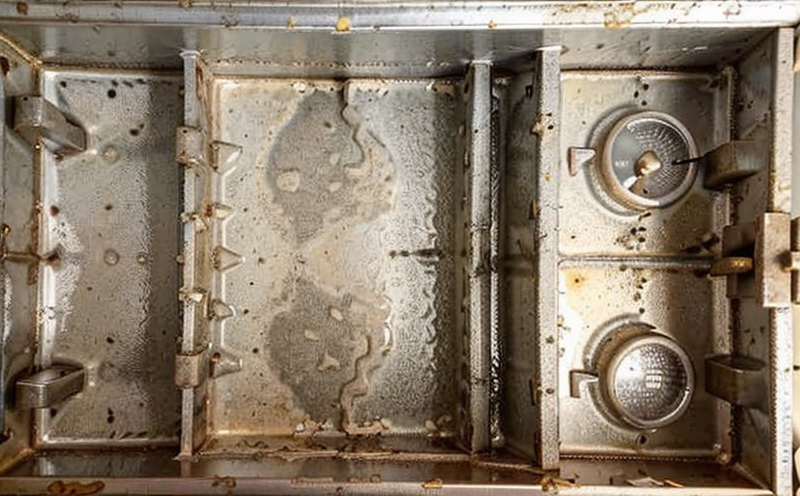Grease trap inspection
The grease trap inspection is a critical component of wastewater management and food safety within commercial kitchen operations. Grease traps are designed to intercept fats, oils, and grease (FOG) before they enter the municipal sewer system. Without proper maintenance, these FOGs can solidify in pipes, causing blockages that lead to costly repairs, environmental damage, and potential health hazards.
Our inspection services focus on ensuring compliance with local regulations such as the U.S. Environmental Protection Agency guidelines for FOG management in commercial establishments. We utilize advanced technologies to assess the condition of grease traps, identify blockages, and recommend necessary cleaning or replacement.
The inspection process involves a thorough visual assessment combined with specialized tools like video cameras that can navigate tight spaces within the pipes. This allows us to pinpoint not only visible issues but also hidden obstructions that could otherwise go undetected until significant damage occurs.
For quality managers and compliance officers, our inspections provide peace of mind by ensuring adherence to strict hygiene standards set forth by bodies like the U.S. Food and Drug Administration. In R&D environments, we assist in optimizing grease trap designs for future-proofing against increasingly stringent regulations.
Our services also extend beyond mere inspection; they encompass comprehensive reports that detail findings along with actionable recommendations. These reports are invaluable tools for procurement departments as they help in making informed decisions regarding maintenance contracts and equipment purchases.
Why It Matters
The importance of grease trap inspections cannot be overstated, particularly given the environmental implications associated with improper FOG management. When grease enters public sewers without being intercepted, it can cause blockages leading to sewage overflows which are detrimental both ecologically and economically.
- Prevention of Sewer Overflows: Properly maintained grease traps prevent fats from solidifying in the sewer lines, thus avoiding costly clean-ups and potential health risks.
- Reduction in Maintenance Costs: Regular inspections reduce the likelihood of expensive emergency repairs that arise when blockages are ignored until they become critical issues.
The impact extends beyond just infrastructure; it also influences public health. By reducing FOG-related blockages, we contribute to cleaner waterways and healthier communities. This aligns with broader sustainability goals aimed at preserving natural resources for future generations.
For businesses operating within the hospitality or foodservice sectors, compliance with local regulations is non-negotiable. Non-compliance can result in hefty fines and damage to reputation. Our inspections ensure that your business remains compliant while minimizing risks associated with FOG management.
Benefits
- Enhanced Compliance: Stay ahead of regulatory changes by ensuring full compliance with local, state, and federal standards for grease trap maintenance.
- Cost Savings: Avoid costly emergency repairs by catching potential issues early through regular inspections. This also reduces the need for more frequent cleaning schedules due to accumulated FOG buildup.
- Informed Decision-Making: Detailed inspection reports provide valuable insights into current conditions, allowing for informed procurement and maintenance strategies tailored specifically to your establishment's needs.
- Improved Environmental Impact: By preventing FOG from entering public sewers, you contribute positively towards maintaining clean waterways which supports overall ecosystem health.
Incorporating grease trap inspections into your routine not only meets regulatory requirements but also enhances operational efficiency and sustainability efforts. It is an investment in long-term success that pays dividends through reduced expenses and improved reputation management.
Environmental and Sustainability Contributions
The practice of grease trap inspection plays a pivotal role in environmental stewardship, contributing significantly to sustainable practices within commercial kitchens. By intercepting FOG before it reaches the sewer system, these inspections prevent significant environmental impacts such as blockages and pollution.
- Reduction in Sewer Overflows: Properly maintained grease traps help reduce instances of sewage overflows which can contaminate water sources and harm aquatic life. This aligns with broader sustainability goals aimed at preserving natural resources for future generations.
- Promotion of Circular Economy Principles: Through regular inspections, businesses ensure that FOG is not wasted but instead repurposed or recycled into biofuels, thus closing material loops within the waste management cycle.
The commitment to sustainability extends beyond individual establishments; it fosters a culture of responsibility among stakeholders involved in food production and consumption. By integrating grease trap inspections into their operations, businesses demonstrate their dedication to environmental protection and social responsibility.
Our services go beyond just meeting compliance requirements; they offer opportunities for continuous improvement in greener practices. With ongoing advancements in technology and regulatory frameworks around FOG management, staying updated through regular inspections ensures alignment with evolving standards.





